The GDS: A High-Performing Distribution Channel Too Many Hotels Overlook
How important is it to list on the GDS? And how well does the GDS perform compared to other distribution channels? As a worldwide CRS, D-EDGE helps hotels develop their sales on all channels and knows that the GDS isn’t always used by hotels to its full potential.
To better understand the opportunities hotels are missing, we conducted an analysis of booking data from independent hotels and small to medium-sized hotel groups across Europe and Asia Pacific. We also interviewed hoteliers about their experiences with the GDS. Some of our findings may surprise you—they certainly surprised us!
As leisure travel rebound has reached its peak in most parts of the world, hoteliers are turning their attention to the corporate segment to meet revenue objectives and drive growth.
And the timing couldn’t be better. After a lagging recovery following the pandemic, the business travel segment is gaining momentum. This year, global spend is expected to increase by 11.1% over 2023 and to grow at a compound annual growth rate (CAGR) of 7.0% from 2025 to 2028. By 2028, the business segment is forecasted to reach over US $2.0 trillion in value, according to the Global Business Travel Association (GBTA).
For hotels, a key source of business travel is the GDS (Global Distribution System). In fact, about 80% of GDS bookings are corporate, whereas 20% are leisure. And business travellers are about twice as valuable to travel suppliers as leisure travellers, according to Amex GBT.
A large share of corporate travel is managed by travel management companies (TMCs) like CWT, Amex GBT, BCD, and ABC Global Services. TMCs book hotels almost exclusively through the GDS, either through their travel agents or, more frequently these days, via self-booking tools used by employees of their corporate clients. Travel consortia like Internova Leaders Network and Signature Travel Network also book accommodations primarily through the GDS.
As part of their services, TMCs source and negotiate a list of preferred vendors on behalf of their clients, sending out annual requests for proposals (RFPs) to hotels. Being listed on the GDS is the first step of the strategy to bid for this business.
You are not familiar with GDS and wonder whether it’s right for your hotel? Check out this article, where we answer all your questions about the GDS as a distribution channel for hotels.
Request a GDS audit
Get in touch with our distribution experts.
What Role Does the GDS Play in Hotel Distribution?
D-EDGE Hospitality Solutions receives frequent enquiries from hoteliers who are considering listing on the GDS but aren’t sure what to expect. To provide insights, we conducted an analysis of GDS performance and compared it to other major distribution channels (cf methodology at the bottom of the post).
GDS distribution has long been a source of mystery for many hoteliers, with no shortage of opinions but often lacking concrete data. At D-EDGE, we empower thousands of hotels to access this channel, and we’ve witnessed firsthand an extraordinary rebound in the business travel market over the last months. More importantly, we see that hotels utilising the GDS achieve stronger performance in areas such as ADR, length of stay, and cancellation rates. However, the GDS is not suitable for every hotel, and this article aims to provide the data and insights needed to make informed decisions.
1. The GDS has been the Fastest-Growing Distribution Channel since 2023
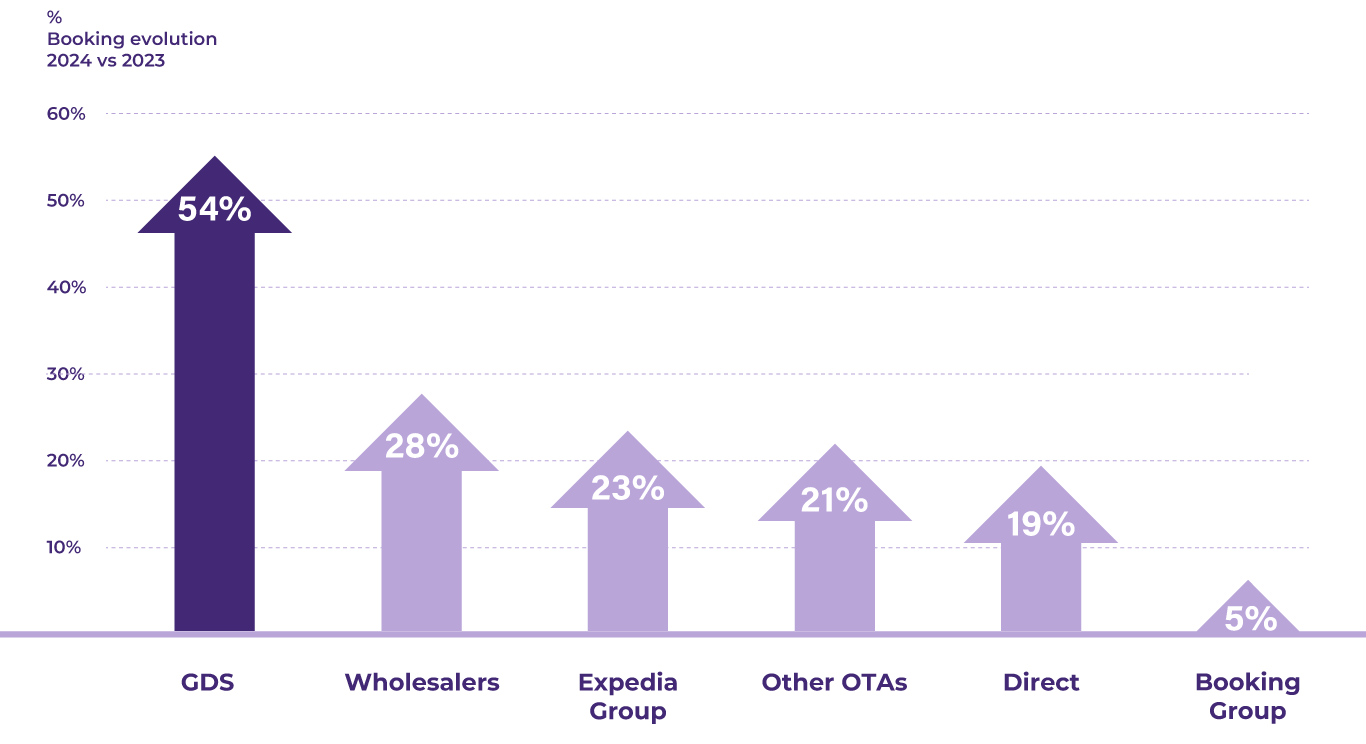
This year, the GDS has grown faster than any major distribution channel. From January to May, GDS bookings increased by 54% over last year. By comparison, the wholesale segment grew by 28%, direct bookings were up by 19%, and Booking Holdings (including Booking.com, Priceline and Agoda) increased by only 5%.
The data supports other indicators of recovering business travel. Nevertheless, GDS distribution share can vary substantially by property. At the Evergreen Laurel Hotel in Paris, for example, the GDS generated 10% of total revenue in 2023, according to Magali Malherbe, the hotel’s Director of Sales & Marketing.
“Production is increasing more and more,” she told D-EDGE. “We are a business hotel, and we have contracts with many companies in our area. More companies now use a booking tool to make reservations, so it’s important for us to have GDS distribution. It helps us expand our international customer base, enhance our hotel’s visibility and brand recognition, and access new market segments.”
At Establishment Hotel in Sydney, Australia, the GDS share is even higher, at about 20% of total bookings. “The GDS gives us more visibility and helps us capture more of the corporate market, who prefer to book through their travel management company,” Rano Huang, Hotel Manager, told D-EDGE.
The GDS gives us more visibility and helps us capture more of the corporate market, who prefer to book through their travel management company.
2. GDS Bookings Have one of the Highest ADR
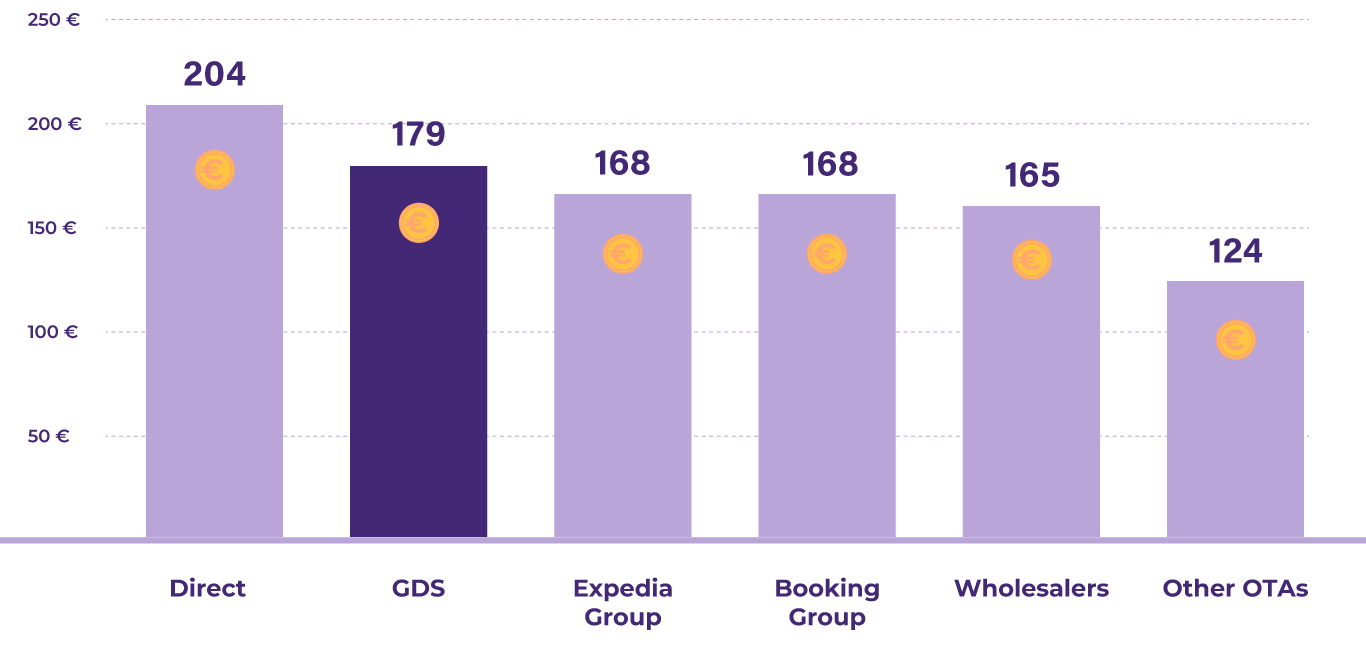
At €179, GDS bookings generated the second highest average daily rate (ADR) during the January to May period, exceeded only by direct bookings at €204, and well ahead of OTA rates, which ranged from €124 to €168.
This is particularly significant because the majority of sales via the GDS are entry-level room types, whereas other channels sell all room categories, including premium rooms and suites.
At Platzl Hotel in Munich, a strong ADR is a primary motivation for listing on the GDS.
We use the GDS for consortia business, short-term bookings, contracted business, and high ADR. Consortia customers tend to pay higher rates, and contracted businesses accept dynamic rates. With the GDS, we can manage rates dynamically.
3. GDS Bookings Have the Second Longest Length of Stay
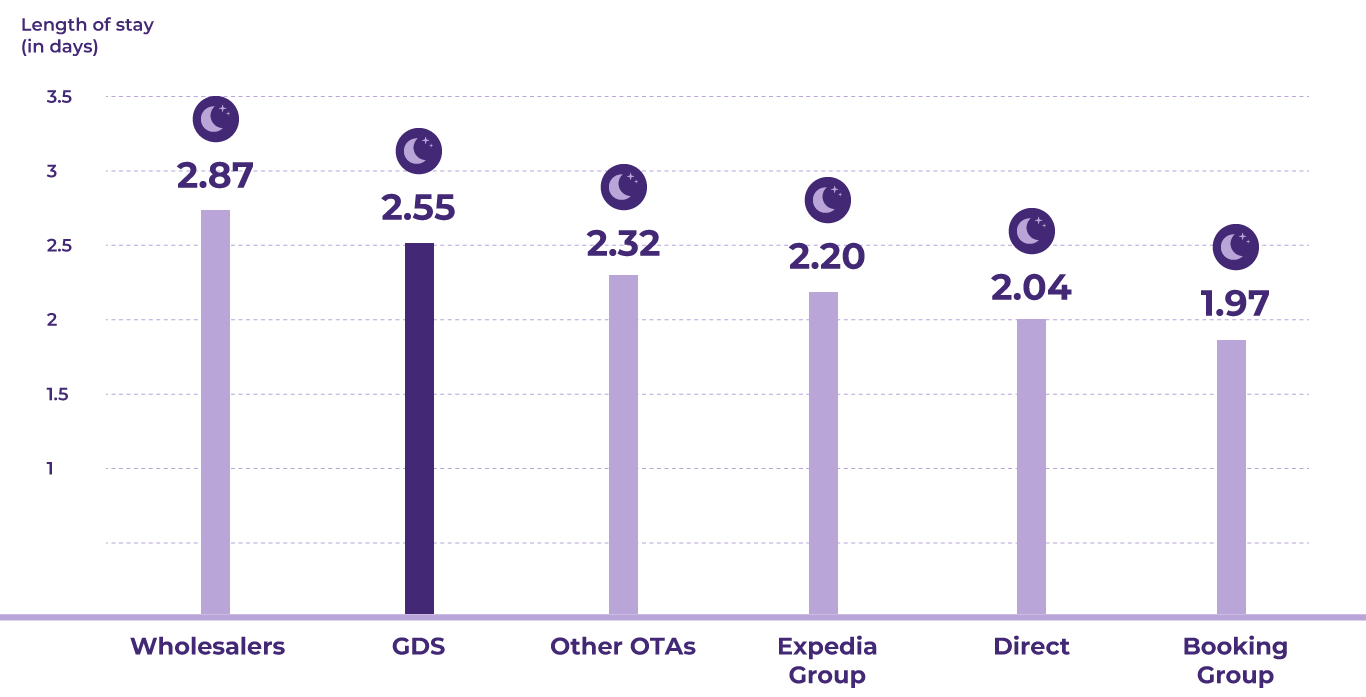
At 2.55 days, the GDS beat all channels but wholesale when it came to average length of stay (LOS). Given that business trips are generally shorter than leisure trips, we were surprised by this data. It might be related to the growing trend of “bleisure” or “blended” travel, as more travellers take advantage of the flexibility of remote working to extend business trips for leisure purposes (and vice versa).
The trend isn’t showing signs of slowing down. From 2024 to 2034, the bleisure tourism market is predicted to grow at an annual rate of 19.5%, reaching US $4.2 trillion in value by 2034, according to Future Market Insights.
4. The GDS Has by Far the Lowest Cancellation Rate
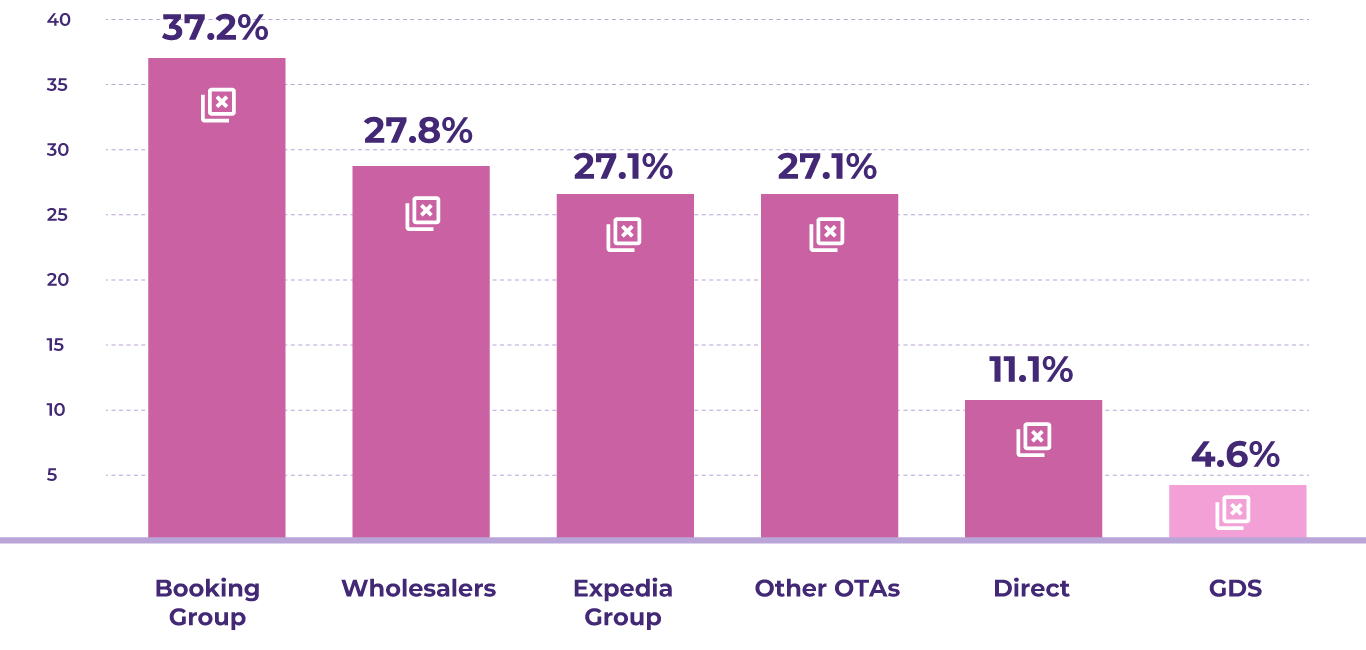
High cancellation rates are a bane of the hotelier’s existence, making it difficult to forecast performance accurately and optimise occupancy. At only 4.6%, GDS cancellation rates make revenue strategy far more manageable. By comparison, the average cancellation rate for Booking Holdings was a daunting 37.2%, and for wholesalers it was 27.8%.
“For us, the cancellation rate on the GDS is definitely lower than on other distribution channels, but it depends on the guest,” said Julia of Platzl Hotels. “Our business travellers tend to book short term, so they’re less likely to cancel. And leisure travellers who go into a travel agency to plan a trip have much higher intention than on an OTA, where it’s easy to book and cancel.”
At the Evergreen Laurel Hotel, in addition to low cancellation rates, Magali likes the fact that GDS reservations are guaranteed in the event of no-shows.
The cancellation rate on the GDS is definitely lower than on other distribution channels… Our business travellers tend to book short term, so they’re less likely to cancel. And leisure travellers who go into a travel agency to plan a trip have much higher intention than on an OTA, where it’s easy to book and cancel.
5. GDS is the Second Least Expensive Channel
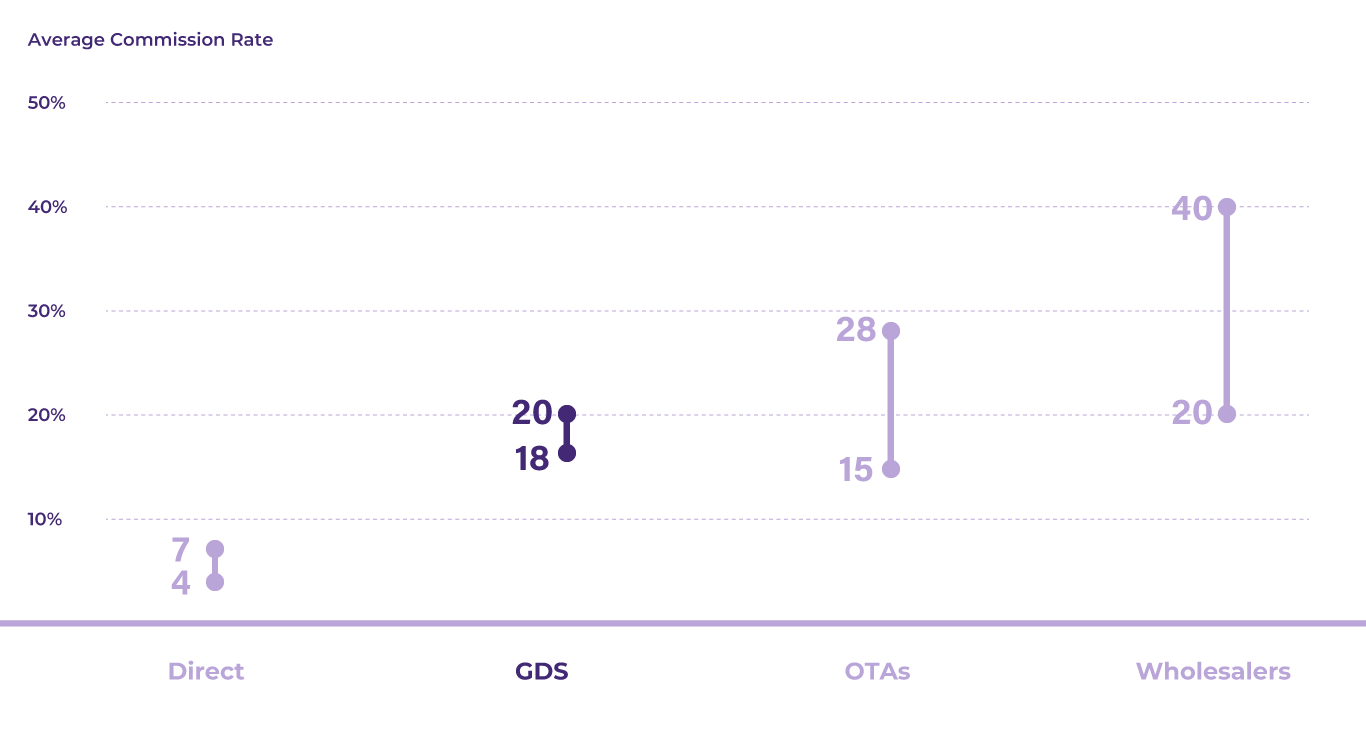
In terms of distribution costs, the GDS proves to be a more affordable option for hoteliers than often perceived. With total distribution costs averaging between 18% and 20%, it ranks as the second least expensive channel, just behind direct bookings, which typically incur costs of 4% to 7%, depending on whether advertising is used. In contrast, Online Travel Agencies (OTAs) generally charge higher fees, ranging from 15% to 22%. Loyalty programmes like Booking.com’s Genius or Expedia’s Rewards, can push these costs even higher, with commissions rising to between 25% and 28%. Wholesale channels are among the most expensive, with commissions ranging from 20% to 40%. For hotels seeking to optimise their distribution strategy and control costs, the GDS offers a competitive balance between cost and reach.
And That’s Not All – Additional Benefits of the GDS
We asked hoteliers what other advantages they enjoy from being listed on the GDS. Here are the highlights:
- Easily manage rates & availability. “The GDS is very flexible in terms of managing rates and availability in real time,” said Magali of the Evergreen Laurel Hotel. “We are free to open, close, create, and modify our selling prices whenever we want.”
- Reach new markets. “We’re launching a new luxury suite product this year, with campaigns in the GDS to reach new markets we didn’t have before,” said Julia of Platzl Hotel. “With the GDS, we can reach travel agencies in these markets right away.”
- Smooth out seasonality. Since a lot of corporate travel takes place in low and shoulder seasons, GDS bookings help boost year-round occupancy. Moreover, with the rise of blended travel, more business travellers stay through the weekend, spreading demand throughout the week.
- Access preferred listings. “Preferred listings are expensive, but if you have a specific partner, it will open the door to other travel agencies who wouldn’t book your hotel otherwise because you’re not part of their preferred hotel list,” Julia said.
Want to make the most out of the GDS? Check out our tips and strategies for maximising visibility and bookings on the GDS.
It’s Not Ideal for Every Property: Downsides of the GDS
The hoteliers we interviewed cautioned that while the GDS can be highly beneficial for certain hotels, it’s not always the best fit for all hotels.
“In my opinion, GDS distribution is mandatory for any business hotel but not for those focused on leisure business,” said Magali of the Evergreen Laurel Hotel.
For Julia of Platzl Hotel, the drawbacks include limitations with seasonality, cancellation policies, and availability restrictions. “The GDS is an old-school system that hasn’t developed much since the 80s,” she said. “You’re limited with descriptions and pictures, and you must rely on a third party to load rates and check your profile.”
She also finds the GDS payment structure a bit complex. “And it’s quite expensive when you add up the transaction fees, clearing fees, commissions, and costs of preferred listings and marketing campaigns,” she said.
Nevertheless, it’s important to consider net contributions when assessing the relative value of distribution channels. Not only are GDS costs offset by a higher ADR than other channels, but the costs are also comparatively lower than OTA commissions, which can climb to as high as 28% on some sites. And low-rated OTA business can attract price-sensitive travellers who are more likely to leave bad reviews when expectations are unmet.
To decide whether or not to list, hoteliers should determine if GDS customers fit into their business mix, Julia advised. “If your strategy is to build occupancy and your budget is low, the GDS might not make sense. Look at the impact of the GDS in your market. If no hotels are listed, it’s probably not the best location.”
Is your hotel well-suited for GDS distribution? It takes only a few minutes to find out. Take our GDS quiz for hotels.
To Recap: Our 3 Key Takeaways
- GDS continues to be a thriving distribution channel for hotels, particularly for properties located near airports, industrial areas, or business district.
- Despite misconceptions, GDS bookings consistently outperform other indirect channels in terms of net contribution. The higher average daily rate (ADR) associated with GDS bookings contrasts favourably with the lower ADR and more and more exorbitant commission rates (reaching up to 28%) charged by online travel agencies (OTAs).
- By partnering with a company like D-EDGE, hotels can navigate the complexities of GDS distribution seamlessly, benefiting from a one-stop-shop solution and dedicated support.
Finding the Right GDS Connectivity Provider
Deciding to list on the GDS is just the beginning. Most independent hotels and small groups must connect to the GDS via a Channel Manager or Central Reservation System (CRS). However, not all connectivity providers are the same.
D-EDGE’s CRS makes GDS distribution simple for hoteliers in several key ways:
- Direct connectivity. Unlike other providers, D-EDGE offers direct connectivity to all GDS platforms, making hotels bookable by 600,000 travel agents and thousands of travel managers in corporations worldwide.
- One central platform. Hotels can manage pricing and availability on the GDS, booking engine, and OTAs all in the same place.
- An easier payment process. “At D-EDGE, we consolidate all costs into a single invoice for the hotel, while we handle payments to each partner separately and ensure that commissions are paid to the travel agencies,” said Laurence Corrieras, our resident GDS expert. “This approach not only makes the process easier for the hotel but also keeps the overall cost comparable to that of OTAs.”
- Streamlined profile updates. While static content updates can seem daunting, D-EDGE centralises everything into one document and takes care of updates on behalf of hotels. “It may be a complex system behind the scenes, but for our hotels, it’s straightforward and hassle-free,” Laurence said.
- Detailed performance tracking. With its previous provider, Platzl Hotel encountered issues with rate visibility, production tracking, and customer support. “After we changed to D-EDGE, we could track which companies were booking which rates and why,” Julia said. “Now it’s easier to make improvements because there’s a GDS team you can talk to. They go through it with you and let you know if information is missing and how to get more visibility.”
- Improved performance. “D-EDGE helps us improve our GDS booking performance by providing support and advice on which consortia might benefit us,” Rano of Establishment Hotel said. “They also respond promptly to issues with connectivity, rate loading, rate plans, etc.”
- Responsive support. “In my 34 years of experience in the hotel industry, I have worked with many GDS representatives, and the easiest to use and most professional for me is D-EDGE,” said Magali of the Evergreen Laurel Hotel. “The interface is easy to use, rates and availability are updated immediately, and the client support team is very responsive.”
In my 34 years of experience in the hotel industry, I have worked with many GDS representatives, and the easiest to use and most professional for me is D-EDGE. The interface is easy to use, rates and availability are updated immediately, and the client support team is very responsive.
The GDS: Part of a Diverse Distribution Strategy
With its rapid growth, high average rate, longer stays, and low cancellation rates, the GDS represents a small but critical part of a diverse distribution strategy.
“To get optimal results on the GDS, however, you need to actively manage your presence,” advises Isabelle of D-EDGE. “This includes creating detailed, appealing listings, offering attractive rates and policies, and participating in corporate and consortia programs. You also need a technology partner who can provide seamless connectivity, expert advice, and reliable support.”
Said Rano of Establishment Hotel, “If your target market is predominantly corporate, listing on the GDS is definitely a no-brainer.”
Methodology
The data was drawn from digital bookings made between January 1 and May 31, 2024, and compared to the same period the previous year. The data set included 367 independent hotels and small to medium-sized groups from across Europe and Asia Pacific, a mix of 3, 4, and 5-star properties.
Get expert advise
To request a GDS audit or find out more about how to list on the GDS, contact a distribution expert at D-EDGE today.
You may also like
The 2025 Hotel Direct Distribution Report reveals the smartest strategies to boost ROI and future-proof your direct booking channels in an…
Paris, November 2024 – D-EDGE Hospitality Solutions, the leading provider of hospitality technology, is proud to announce its partnership with Pichet group,…
As the hospitality industry faces a new era of complexity, simply tracking basic performance metrics is no longer enough. Hoteliers need to…
Hotel Traveltine, Downtown Singapore – a stylish mid-scale property in Downtown Singapore, is redefining the competitive hospitality market with the power of…
D-EDGE Hospitality Solutions, the leading provider of innovative hotel technology solutions, is pleased to announce the appointment of Damini Lykidi Diehl…
Stop getting ghosted by your guests! Keep no-shows and last-minute cancellations away from your hotels

